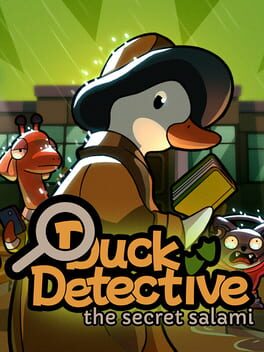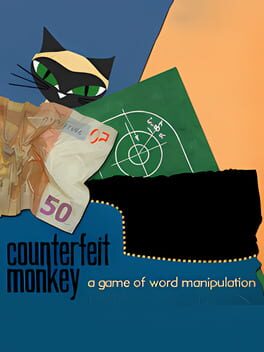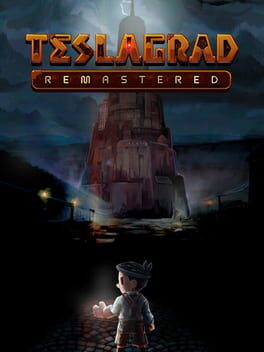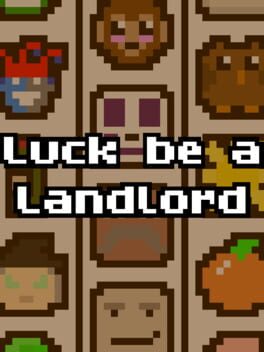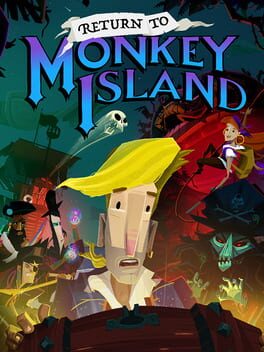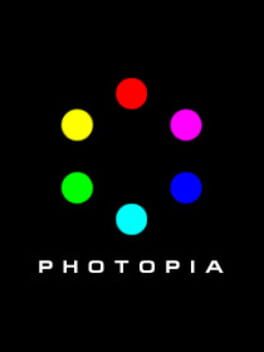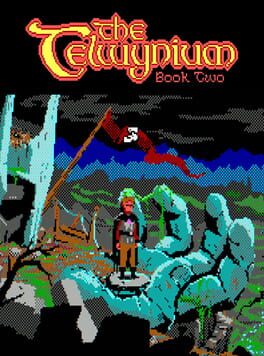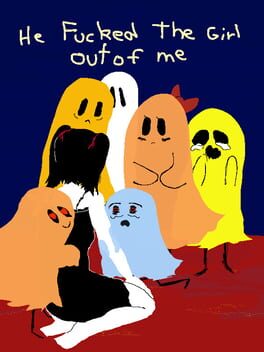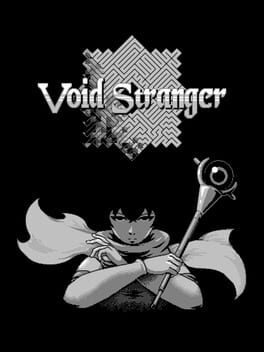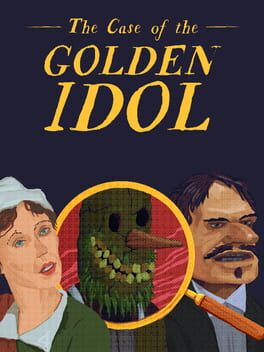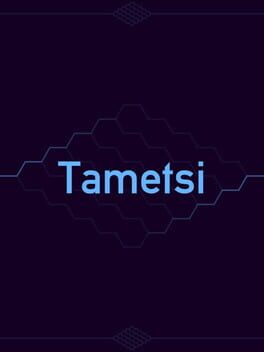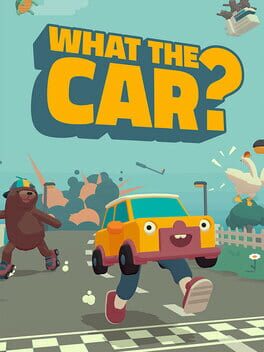lukebee
This was really cute! I’d heard some Obra Dinn comparisons in the past when talking about this game, but it’s more specifically a Golden Idol-like: as you investigate you pick up keywords that you then have to use to fill out a summary of the facts of the case. The main difference is that unlike either of those games, you don’t get to view the time-stopped moment of the crime, it’s instead a much more standard “walk around looking for clues and interrogating potential suspects/witnesses” sort of deal; Frog Detective minus the adventure game fetch quest chains. Speaking of interrogations, I wasn’t expecting the voice acting at all so I burst out laughing when the gritty noir voice first came out of the cute cartoon duck. The voice acting is honestly maybe the highlight of the whole thing, the performances were all really fun. Especially happy to hear Brian David Gilbert in this, love that guy. I also loved the mechanic where you inspect someone and can actually see a more detailed version of their sprite through your magnifying glass, it lends itself nicely to little plot reveals and visual gags.
2012
Was hit with a sudden urge to replay this recently, and it still rules. For the unfamiliar, Counterfeit Monkey is a parser-IF game (aka a text adventure) set in a version of our world that operates on “observer-consensus reality”. What this means in a nutshell is that objects (and people!) can be transformed by manipulating the words associated with them: a monkey can be turned into a stack of cash with the removal of the letter K, a head of lettuce can be turned into a severed head, and so on.
It’s a great conceit for a bunch of clever and silly wordplay puzzles, mostly oriented around the full-alphabet letter remover you start the game with, but what I really love about Counterfeit Monkey is that it also tries to seriously answer the question “What if language literally shaped reality?”. The dystopian government cracks down on foreign languages and nonstandard spellings and punishes offenders by transforming them into inanimate objects (in some cases until they lose the ability to turn back); ambitious idealists try encouraging mass adoption of new terminology that could help depollute the planet or develop entire conlangs to solve world hunger; a growing protest movement co-opts a patriotic symbol and in doing so changes how instantiations of its name manifest. And that’s not even getting into the circumstances of the player character, a student named Alex and a smuggler named Andra fused together into one person named Alexandra, the resulting feminine body causing Alex (who serves as the narrator) some pretty obvious gender dysphoria. And for all that, it’s still a game where you can wear a pair of goggles that convert everything to British spelling for basically no reason (I never found a real use case, at least) or remove an L from a clock and combine the result with a ring to get an object that provokes some hilarious reactions from Alex. (Don’t blame me for being filthy-minded, I made that specific thing just out of curiosity but the game was literally asking me to generate an innuendo-adjacent object at the time.)
It’s a great conceit for a bunch of clever and silly wordplay puzzles, mostly oriented around the full-alphabet letter remover you start the game with, but what I really love about Counterfeit Monkey is that it also tries to seriously answer the question “What if language literally shaped reality?”. The dystopian government cracks down on foreign languages and nonstandard spellings and punishes offenders by transforming them into inanimate objects (in some cases until they lose the ability to turn back); ambitious idealists try encouraging mass adoption of new terminology that could help depollute the planet or develop entire conlangs to solve world hunger; a growing protest movement co-opts a patriotic symbol and in doing so changes how instantiations of its name manifest. And that’s not even getting into the circumstances of the player character, a student named Alex and a smuggler named Andra fused together into one person named Alexandra, the resulting feminine body causing Alex (who serves as the narrator) some pretty obvious gender dysphoria. And for all that, it’s still a game where you can wear a pair of goggles that convert everything to British spelling for basically no reason (I never found a real use case, at least) or remove an L from a clock and combine the result with a ring to get an object that provokes some hilarious reactions from Alex. (Don’t blame me for being filthy-minded, I made that specific thing just out of curiosity but the game was literally asking me to generate an innuendo-adjacent object at the time.)
2023
I remembered enjoying Teslagrad back in the day, and yeah, it's still pretty good! Can't say I cared much for the boss fights, but flinging your character around with magnetic attraction and repulsion is a good time, and the remastered graphics look great. Really glad the game eventually marks the collectables on the map so I didn't have to rely on a walkthrough to get the true ending, though I did manage to find nearly all of them on my own before then.
2022
An incredible historical murder mystery narrative set in a 16th century abbey. Phenomenal lettering work, which feels like a strange thing to fixate on in a video game, but the way different characters' dialogue is presented in different scripts or print based on their occupation or background (or more accurately, your character's perception of them—there's at least one instance where the font changes when you learn that a character is more educated than previously thought) is some fantastic attention to detail, as are the occasional appearance of typos that are then crossed out and corrected, and references to Jesus/God that are filled in after the rest of the sentence as the writer switches to red ink. That attention to detail extends to the narrative as well, which does a great job laying out the rich social fabric of the abbey, from the monks to the peasants, and the slowly brewing class tensions between the different factions, and the story goes to some surprising and genuinely heartbreaking places.
Also, slight spoilers here, but I loved how the game refuses to let you off easy when it comes to solving the murders and accusing a suspect. This ain't Ace Attorney; the evidence is never decisive and the suspects don't break down and confess when confronted, so there's this awful lingering feeling of "what if I got it wrong?" that you just have to sit with and live with as your meddling costs people their lives, and I think that rules.
Also, slight spoilers here, but I loved how the game refuses to let you off easy when it comes to solving the murders and accusing a suspect. This ain't Ace Attorney; the evidence is never decisive and the suspects don't break down and confess when confronted, so there's this awful lingering feeling of "what if I got it wrong?" that you just have to sit with and live with as your meddling costs people their lives, and I think that rules.
2023
Addictive little roguelike deckbuilder based around manipulating the symbols that appear on a slot machine. Add symbols that increase the income of your other symbols, add symbols that destroy other symbols for big one-time payouts, and prune away symbols that bring down your average payout. Once you play enough to recognize all the different symbols and items, it’s easy enough to just start picking good ones at a glance and more or less play on autopilot, juggling a few different potential builds until either one of them starts taking off or the whole thing stalls out and the rent payments catch up to you. I didn’t mind the mindlessness of it though, it makes for a really chill zone-out-or-listen-to-a-podcast sort of game.
I do find the slot machine theming kinda funny though, because unlike a real slot machine, the machine payouts are relatively consistent; even if you are reliant on specific arrangements/combinations, they tend to simply require having a couple specific symbols show up in adjacent spots, which you can count on happening every few spins unless you’ve really bloated your machine with too much junk. Instead, it’s the selection of new symbols and items between spins where most of the run-deciding RNG resides.
I do find the slot machine theming kinda funny though, because unlike a real slot machine, the machine payouts are relatively consistent; even if you are reliant on specific arrangements/combinations, they tend to simply require having a couple specific symbols show up in adjacent spots, which you can count on happening every few spins unless you’ve really bloated your machine with too much junk. Instead, it’s the selection of new symbols and items between spins where most of the run-deciding RNG resides.
2022
I'm extremely bad at this (no surprises there given I also sucked at VOEZ and have very little bullet hell experience) and the XP grinding was sometimes annoying, but I had a good time regardless; the story goes so much harder than I was expecting, and it's rad how queer it was. Plus, there's a good number of songs I liked even if not all of them were to my tastes.
Never played a Monkey Island game before (they're slightly before my time) but I really enjoyed this. The jokes are funny, the puzzles are generally pretty good, and there's an interesting thread running through the narrative about nostalgia and trying to recapture your glory days—I was kinda reminded a bit of The Matrix: Resurrections, which was also a legacy sequel that's self-consciously meta about its position as a legacy sequel.
1998
A short and excellent work of parser-based interactive fiction that doesn't really have any puzzles but nevertheless uses its medium to great effect. Really glad I took the spoiler warning in 50 Years of Text Games to heart and went in blind, because there are moments of comprehension and epiphany that were alternately thrilling and devastating, where a single seemingly innocuous line of narration was able to instill a sense of curious wonder or mounting dread (and in the latter case, trying to act on my sudden sense of urgency only let the game twist the knife that much deeper). As John Walker wrote, "to describe [Photopia] is to destroy it", so go play it for yourself to discover what it's about.
A short, semi-autobiographical game about its author's experiences with being poor and transgender and doing sex work and the lasting trauma that came from that. Reminded me a bit of Nathalie Lawhead's work, albeit without any of the black humor to blunt the nausea and discomfort from what's being conveyed.
2023
An incredible Sokoban-style puzzle game that is much, much more than meets the eye. Requires a decent amount of patience and tolerance for friction between the lack of undos, the lives system, and quite a bit of repeating previously solved puzzles, but the payoffs are well worth the effort; this is a game that managed to constantly find new ways to surprise and delight me.
2023
Having played Recursed and Patrick’s Parabox, I perhaps didn’t find Cocoon’s nested-world puzzles quite as mind-bending as I might have otherwise, but I still had a great time solving them even if I rarely felt particularly challenged. It certainly didn’t hurt that solving those puzzles meant getting constantly rewarded with more weird and cool shit to look at; I adored Cocoon’s animation and art direction. Shoutouts in particular to the transitions in and out of the orbs (important to get right since you’re going to be seeing it a lot, and they absolutely nailed it) and all the different doors (I genuinely started looking forward to seeing what new and exciting way the next door was going to open).
2017
2023
